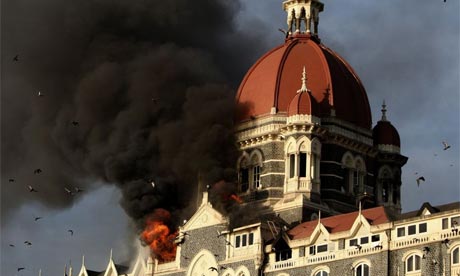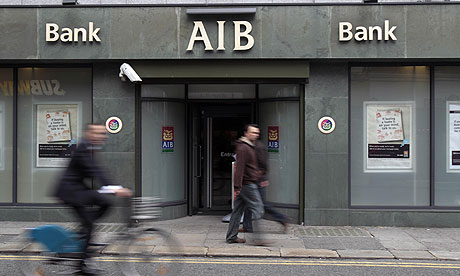 |
| The cables reveal concerns about terrorism in India both before and after the Mumbai terror attacks. Photograph: AFP/Getty Images |
US diplomats are concerned that India could be the target of a biological terror attack, with fatal diseases such as anthrax being released into the country before spreading around the world, confidential cables from the US embassy in New Delhi reveal.
A senior Indian diplomat told the US in 2006 that concerns about biological weapons were "no longer academic", adding that intelligence suggested terror groups were increasingly discussing biowarfare.
"[Diplomat YK] Singh reported that Indian intelligence is picking up chatter indicating jihadi groups are interested in bioterrorism, for example seeking out like-minded PhDs in biology and biotechnology," a cable sent to Washington reports.
"He compared the prospects for nuclear terrorism ('still in the realm of the imaginary') to bioterrorism ('an ideal weapon for terrorism ... anthrax could pose a serious problem ...it is no longer an academic exercise for us')."
Another cable warns that "advances in the biotech sector and shifting terrorist tactics that focus on disrupting India's social cohesion and economic prosperity oblige the [government of India] to look at the possibility of terror groups using biological agents as weapons of mass destruction and economic and social disruption".
It also warns terrorists could easily find the material they need for bioterrorism in India and use the country as a base for launching an international campaign involving the spread of fatal diseases.
"The plethora of indigenous highly pathogenic and virulent agents naturally occurring in India and the large Indian industrial base – combined with weak controls – also make India as much a source of bioterrorism material as a target," diplomats warned.
"Release in an Indian city could facilitate international spread ... Delhi airport alone sees planes depart daily to numerous European, Asian, Middle Eastern and African destinations, as well as non-stop flights to Chicago and Newark.
"Terrorists planning attacks anywhere in the world could use India's advanced biotechnology industry and large biomedical research community as potential sources of biological agents.
"Given the strong web of air connections Delhi shares with the rest of the world and the vulnerabilities that might be exploited at airports, a witting or unwitting person could easily take hazardous materials into or out of the country."
Though its author admitted the chance of such an attack was slim, the cable referred to Indian government intelligence, passed to the US, indicating that Islamic extremist groups were "seeking to recruit or employ biology/biotech PhD graduates from within India".
The cable focused particularly on the lack of preparedness of Indian authorities for such an attack, assessing Indian government assurances that the country could defend itself against bioterrorism to be "unconvincing".
Scientists attached to the US embassy had been shown photographs taken by a senior Indian army officer from "frontline field laboratories for diagnostics of infectious diseases" which "demonstrated a host of poor laboratory security and safety practices, including families sleeping in labs and disposable gloves being washed for re-use or being disposed of as non-hazardous biological waste," the cable reported.
The dispatch is one of many dealing with the threat of terrorism in India sent by diplomats in New Delhi both before and after the attacks on Mumbai, the country's commercial capital, which were carried out by the Pakistan-based Lashkar-e-Toiba (LeT) group in November 2008. Earlier cables focus more on the radicalisation of Muslims within India.
One is optimistic. "India's over 150 million Muslim population is largely unattracted to extremism. India's growing economy, vibrant democracy, and inclusive culture, encourage Muslims to seek success and social mobility in the mainstream and reduces alienation," it said.
Though the Muslim community in India "suffers from higher rates of poverty than most other groups in India, and can be the victims of discrimination and prejudice ... the vast majority remain committed to the Indian state and seek to participate in mainstream political and economic life", the cable continued. "Only a small number of young Muslims have ... gravitated toward pan-Islamic and pro-Pakistan organisations, which sometimes engage in acts of violence".
Post-Mumbai, Pakistan-based groups received the most attention. Cables reveal US diplomats making repeated efforts to reassure their often frustrated Indian counterparts that Washington was working hard to pressure Islamabad to shut down the threat posed to India by Pakistan-based groups.
Last January, weeks after the Mumbai attack, Richard Boucher, the visiting US assistant secretary of state for South and Central Asian affairs, argued about the group with the Indian national security adviser, Shiv Shankar Menon.
"The two men were in full agreement on the need to ensure that Pakistan eliminate Laskhar-e-Tayiba, but disagreed on some tactics," a cable reporting the meeting said.
It continued: "Boucher urged Menon to "tone down" the Indian rhetoric and avoid any military movements that could be misinterpreted. Menon defended India's strategy of publicly pressuring Pakistan's security services, saying they had not yet made the strategic decision to cut ties with Lashkar-e-Tayiba, and that the civilian government was powerless to force this change."
The cable reports Menon telling Boucher: "Let's not insult one another by telling a story that the Pakistan army was not involved ... They're either unwilling to take action, or incapable, or both; any way you look at it, they're involved."
In February this year, P Chidambaram, the Indian Minister of the Interior, told Robert Mueller, the director of the FBI, that Pakistan had "done damn near nothing" to prosecute Mumbai-related terror suspects, according to the cables.
The cables also reveal the constant effort of the US authorities to prevent states such as Syria and Iran from obtaining sensitive material from Indian suppliers.
In 2007, the Indian authorities responded to a request from Washington to block a shipment of a large quantity of graphite to Iran, deemed potentially useful to Tehran's missile programme and in December 2008 American diplomats asked Delhi to block the sale to Damascus of components that they feared would contribute to the development of chemical weapons.
 Twitter
Twitter














